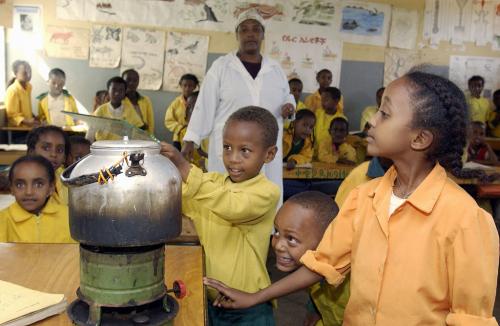Science centres and museums vitally important for sustainable development – UNESCO
Noting the centrality of science in major global sustainable development agenda, the head of the United Nations educational and scientific agency underscored the importance of science centres and museums to build skill and capacities as well as to send strong messages about the importance of science for sustainable development.

Children conduct a science experiment in a classroom in Harar, Ethiopia.
Referring to the 2030 Agenda for Sustainable Development, the Addis Ababa Action Agenda, the Sendai Framework for Disaster Risk Reduction and the Paris Agreement on climate change, UN Educational, Scientific and Cultural Organization (UNESCO) Director-General Irina Bokova said:
“These agreements embody a new vision for prosperity, peace and the planet, to allow every society to create and share knowledge, to nurture every source of innovation and creativity, [and] to craft a more inclusive, sustainable and just path to the future.”
“Taking this forward calls for an ever greater expansion of science and for tighter linkages between science and society,” she added in her message on the occasion of World Science Day for Peace and Development, celebrated annually on 10 November.
This year, the Day is dedicated to the theme Celebrating Science Centres and Science Museums.
Highlighting that these institutions nurture human curiosity, and catalyze research and solutions to help societies meet varied challenges, Ms. Bokova said they also bring together men and women around common values, providing platforms for dialogue, understanding and resilience.
She added that science centres and museums also provide excellent ways to encourage children, especially girls, to pursue careers in science as well as serve as “privileged places of education,” providing as innovative initiatives to promote the learning of science outside the classrooms.
“In this spirit, I invite all of partners and governments to do everything to support, nurture and harness the full power of science museums and centres to shape a more inclusive and sustainable future for all,” she noted.
Proclaimed by the UNESCO General Conference in 2001, the World Science Day for Peace and Development aims to renew national, as well as the international commitment to science for peace and development and to stress the responsible use of science for the benefit of society. The Day also aims at raising public awareness of the importance of science and to bridge the gap between science and societies.
Source: United Nations
- 379 reads
Human Rights
Fostering a More Humane World: The 28th Eurasian Economic Summi

Conscience, Hope, and Action: Keys to Global Peace and Sustainability

Ringing FOWPAL’s Peace Bell for the World:Nobel Peace Prize Laureates’ Visions and Actions

Protecting the World’s Cultural Diversity for a Sustainable Future

Puppet Show I International Friendship Day 2020

